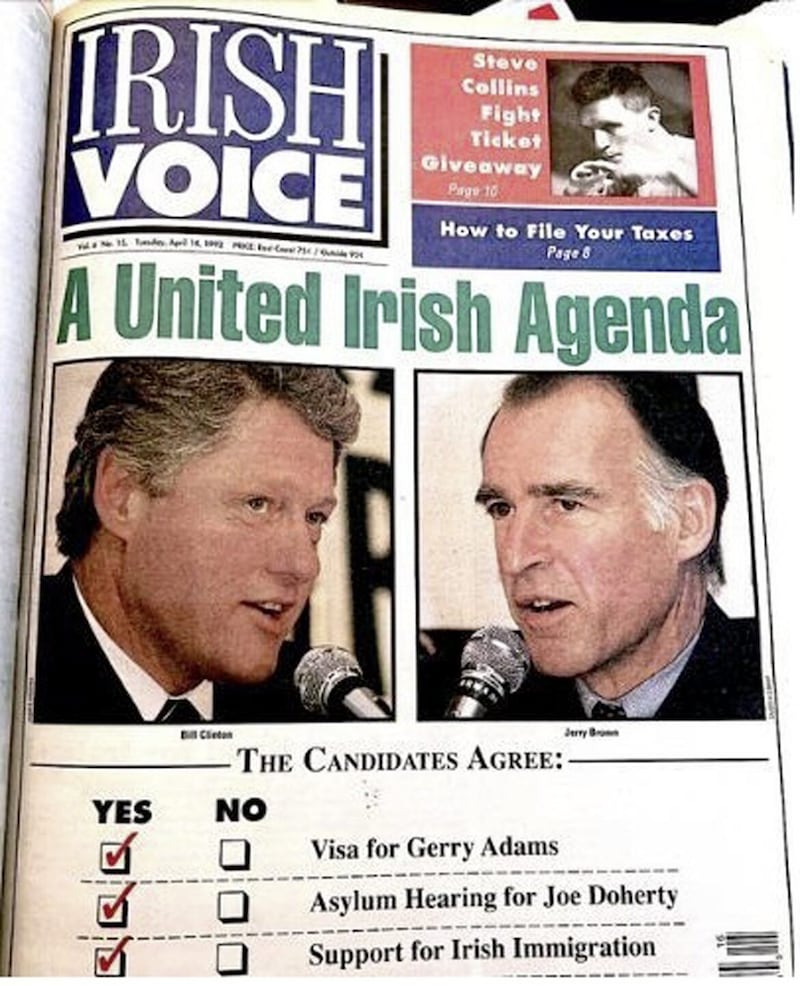THE ongoing shift in the media landscape from print to online has affected a publication which made an important contribution to the peace process and more generally to the relationship between Ireland and the USA, especially the Irish-American community.
The news didn't get a lot of attention on this side of the Atlantic but earlier this month the Irish Voice, a New York-based newspaper, closed down after 36 years. Happily, its online counterpart, IrishCentral.com, founded by the Irish Voice in 2009, continues publication with a reported two million visitors to the site every month.
The newspaper was founded in the late eighties by Niall O'Dowd, a native of Thurles, Co Tipperary, who lived in Drogheda, Co Louth from the age of nine, subsequently graduating with a BA from University College Dublin and moving to the 'States in 1978.
In 1985 he founded Irish America magazine – which happily will continue publication – two years before the Irish Voice first appeared on July 5 1987. O'Dowd's wife, Debbie McGoldrick has edited the paper since 1991.
In a memoir, titled An Irish Voice, he recalls that the decision to start publication of the newspaper was influenced by the arrival of a large number of young emigrants from Ireland – the vast majority of them undocumented – because "the Irish economy floundered and the emigrant plane became the fastest way off the island". The paper would be mainly focused on this community.
Later, in 1991, Niall O'Dowd was a co-founder of Irish Americans for Clinton and the group was part of the successful campaign to get the Arkansas governor elected as US President the following year.
His book recalls how he received a phone-call from Chris Hyland, a leading figure in the Clinton campaign, who asked him a direct question: Could an organisation supporting Clinton be set up in the Irish-American community?
Read more:Deaglán de Bréadún: The Boyne has been the scene of old battles and new hopes
Read more: Deaglán de Bréadún: RTÉ may never be quite the same again
O'Dowd, who had been expecting such a call, replied in the affirmative and placed an article in the next issue of the Irish Voice, inviting those interested to come to an inaugural meeting. About 30 people turned up for the event at the Fitzpatrick Hotel in Manhattan.
A fundraising dinner was held the following month and Clinton himself turned up. O'Dowd told him: "We'd love to see you involved in bringing peace to Ireland." The reply he got was: "I would love to do that. It's an issue I have followed."
Later in the year, a meeting took place with the presidential aspirant that was also attended by leading Irish-Americans, including the legendary Paul O'Dwyer, prominent New York politician and civil rights lawyer. The native of Bohola, Co Mayo was very impressed with Clinton's level of knowledge and interest regarding the conflict in the north and remarked: "If that fella gets elected, he'll make history on Ireland."

How right he was: Bill Clinton got deeply involved and played a central role along with his wife Hillary in securing the Belfast/Good Friday Agreement: the President's last-minute phone calls from the White House to the negotiators at Castle Buildings will go down in history.
O'Dowd also played a major part in securing a visa for Gerry Adams to come to the US in February 1994 – a critical moment in ensuring support for the peace process among Irish republicans and helping to bring about the IRA ceasefire later in the same year.
It was a major news story at the time and, like many others no doubt, I still recall reading the outraged coverage in some of the British newspapers. O'Dowd writes: "The British were apoplectic... Suddenly 200 years of the 'special relationship' had been breached by a US president and an upstart Irish lobby."
At the same time that the foundations were being laid for the Good Friday pact, efforts were also going on to secure a peace agreement in the Middle East that would resolve, or at least calm down, the Israeli-Palestinian conflict. The process was a source of encouragement to those involved in trying to bring our own northern troubles to an end.
Bill Clinton was involved in that also and a famous photograph taken at the White House in 1993 shows him with his arms around Israeli Prime Minister Yitzhak Rabin and Palestinian leader Yasser Arafat. That was the year when the first of the Oslo Accords, a pair of agreements between Israel and the Palestine Liberation Organisation, was signed in Washington DC. The second was signed two years later in Taba, Egypt.
Sadly that particular agreement has not fared as well as its Belfast/Good Friday counterpart. In November 1995, the prime minister was shot and fatally wounded by a right-wing extremist whilst speaking in support of the Oslo Accords at a mass rally in Tel Aviv. The Israeli-Palestinian conflict has entered a new phase of violence of late and it has to be said that the outlook is not good. Clearly a two-state solution would be the best and only viable outcome but, at present, it seems a long way off. Hopefully the Good Friday example is a source of some encouragement to those who are working to bring the conflict to an end. Blessed are the peacemakers.









